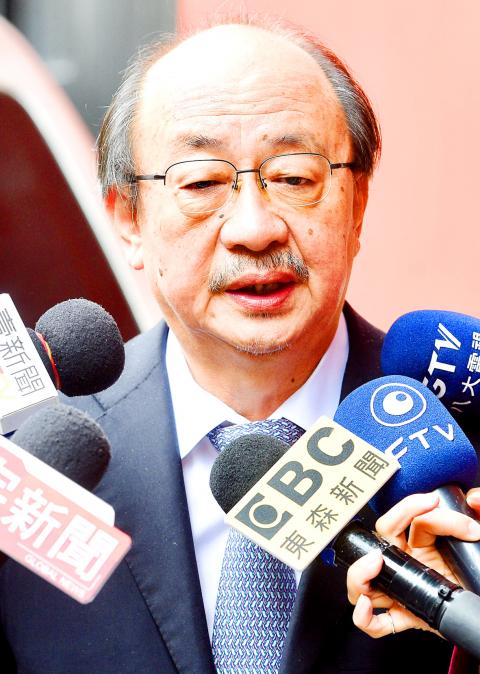The Executive Yuan does not have a fixed timetable for the passage of the draft amendment to the Labor Standards Act (勞動基準法), Premier William Lai (賴清德) said yesterday, after a legislative committee review of the proposal was stalled by Chinese Nationalist Party (KMT) lawmakers.
Speaking on the sidelines of a long-term care event in Taipei, Lai called for a rational review of the draft amendment to bring it more in line with the needs of society.
“At the Executive Yuan, we can decide our own timetable [for draft bills.] However, once they are sent to the Legislative Yuan, we must respect the legislative proceedings. We do not have a fixed timetable” for the bill’s passage, he said.

Photo: Peter Lo, Taipei Times
Despite Democratic Progressive Party (DPP) lawmakers’ failed attempt to complete committee review of the bill on Thursday due to stalling tactics by their KMT counterparts, Lai said the fact the draft amendment was able to survive a plenary vote last week and be forwarded to the committee for review was progress.
That being said, given the limitations of the current “one fixed day off and one flexible rest day” policy in terms of personnel arrangement and working hours, “it goes without saying that the Executive Yuan hopes to see the problem solved as soon as possible,” Lai said.
Thursday’s session yielded little result due to filibustering by KMT Legislator Chiang Wan-an (蔣萬安) for more than two hours.
Labor groups have also protested against the proposed revisions, which would raise the ceiling on the number of consecutive working days from six to 12 days.
The amendment would also allow companies to cut the minimum rest time between shifts from 11 hours to eight hours if they reached an agreement with employees during labor-management negotiations.
The legislation was drafted after the “one fixed day off and one flexible rest day” policy passed by the DPP administration in December last year met with strong criticism from businesses. The policy ensures workers at least one day off after every six days worked and overtime pay for employees working on their flexible rest day.
DPP caucus whip Ker Chien-ming (柯建銘) lamented the caucus’ failure to have the committee pass the draft amendment on Thursday, saying it should serve as a “warning” to the caucus and pointing to “flaws” in the caucus’ operations.
For one, some DPP lawmakers that attended the committee meeting forgot to sign in, which led to the DPP’s defeat in a vote, Ker said.
“We will engage in introspection and make improvements,” he said.
The caucus hopes to pass the proposed amendment as soon as possible, but if it fails to pass the third reading by the end of this year, “surely it can be passed during an extempore session,” he added.
Meanwhile, KMT Chairman Wu Den-yih (吳敦義) said he fully supports Chiang’s and the KMT caucus’ goal.
“The draft amendment should be able to create a win-win situation for both employers and employees. There are some steps that have been overlooked in the legislative proceedings, such as holding more public hearings nationwide to bridge the differences between workers and management,” Wu said.
Additional reporting by Sean Lin

A preclearance service to facilitate entry for people traveling to select airports in Japan would be available from Thursday next week to Feb. 25 at Taiwan Taoyuan International Airport, Taoyuan International Airport Corp (TIAC) said on Tuesday. The service was first made available to Taiwanese travelers throughout the winter vacation of 2024 and during the Lunar New Year holiday. In addition to flights to the Japanese cities of Hakodate, Asahikawa, Akita, Sendai, Niigata, Okayama, Takamatsu, Kumamoto and Kagoshima, the service would be available to travelers to Kobe and Oita. The service can be accessed by passengers of 15 flight routes operated by

Chinese spouse and influencer Guan Guan’s (關關) residency permit has been revoked for repeatedly posting pro-China videos that threaten national security, the National Immigration Agency confirmed today. Guan Guan has said many controversial statements in her videos posted to Douyin (抖音), including “the red flag will soon be painted all over Taiwan” and “Taiwan is an inseparable part of China,” and expressing hope for expedited reunification. The agency last year received multiple reports alleging that Guan Guan had advocated for armed reunification. After verifying the reports, the agency last month issued a notice requiring her to appear and explain her actions. Guan

GIVE AND TAKE: Blood demand continues to rise each year, while fewer young donors are available due to the nation’s falling birthrate, a doctor said Blood donors can redeem points earned from donations to obtain limited edition Formosan black bear travel mugs, the Kaohsiung Blood Center said yesterday, as it announced a goal of stocking 20,000 units of blood prior to the Lunar New Year. The last month of the lunar year is National Blood Donation Month, when local centers seek to stockpile blood for use during the Lunar New Year holiday. The blood demand in southern Taiwan — including Tainan and Kaohsiung, as well as Chiayi, Pingtung, Penghu and Taitung counties — is about 2,000 units per day, the center said. The donation campaign aims to boost

The Central Weather Administration (CWA) said a magnitude 4.9 earthquake that struck off the coast of eastern Taiwan yesterday was an independent event and part of a stress-adjustment process. The earthquake occurred at 4:47pm, with its epicenter at sea about 45.4km south of Yilan County Hall at a depth of 5.9km, the CWA said. The quake's intensity, which gauges the actual effects of a temblor, was highest in several townships in Yilan and neighboring Hualien County, where it measured 4 on Taiwan's seven-tier intensity scale, the CWA said. Lin Po-yu (林柏佑), a division chief at the CWA's Seismological Center, told a news conference